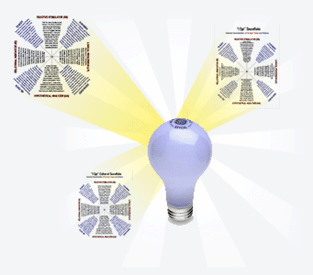Knowledge you can build upon
Research

The Institute periodically sponsors research into actual field data to which it has access. The research ranges broadly on topics of current or historical interest in Organizational Development (OD ). "I Opt" data and Organizational Engineering (OE) generated hypothesis typically form the basis of the research.
The research typically follows accepted academic standards in terms of the statistical methodology employed. However, it usually does not follow the academic writing standards of comprehensive citation of all work in an area. Rather, only publications actually referenced (if any) in the conduct of research are cited. This decision is intended to make the research more accessible and relevant to actual implementation at the cost of lessening its contribution to future, additional research.
- CEO Insights
- Ninety eight (98) CEOs from both profit and non-profit sectors were researched. The research showed that all CEOs shared a family resemblance. However, non-profit and profit sector CEOs showed a systematic difference in the way they approached issues. In addition, it was found that CEOs of large firms tended to have more inclination toward ideas while those of bantum size firms tend to be more inclined toward action.
- Read More
- Gender Related Strategic Style Differences
- Three hundred Corporate Level VP's and 1,429 Managers/Directors were divided by gender and compared. The research found that males and females are literally (not just virtually) identical in the information processing (i.e., strategic style) approach that they apply in addressing corporate issues.
- Read More
- Information Processing Styles of Nurses and Nurse Managers
- by: Beatrice Kalisch, Titus Distinguished Professor of Nursing, University of Michigan.
- This PowerPoint presentation outlines Dr. Kalisch's groundbreaking study of nurses in two major medical institutions. She finds systematic differences within the medical profession (e.g., RN, LPN, NA, etc.) as well as between nurses and other non-medical areas. Her findings isolate the causes of some of the major problems currently confronting the nursing profession. Dr. Kalisch offers both recommendations for immediate action and directions for future research.
- Read More
- "I Opt" Validity: Validation Explained in English
- This article explains what validation is and why it is important in language that is understandable to everyone. All eight dimensions of validity (content, face, construct, convergent, discriminant, concurrent, predictive and conclusion) as well as reliability are treated.
- Read More
- Leadership Development
- Dr. Ashley Field's doctoral dissertation research is updated and extended. Dr. Fields conclusions on strategic styles are found to hold when applied to a larger sample of 919 teams. The research was then extended to include strategic patterns in addition to styles. The results suggest that leadership development must be approached as a staged process rather than as a universal "one size fits all" approach.
- Read More
- Consultant Profile: Getting the Gig
- Research on 185 external and 67 internal consultants was conducted. Internal and external consultants were similar except that internal consultants were more committed to disciplined methods (input) and thought mode (output). Consultants are shown to be markedly different from the general population (n=24,765). They also differ systematically from various levels in the corporate hierarchy and most closely approximate the CEO in their information processing approach.
- Read More